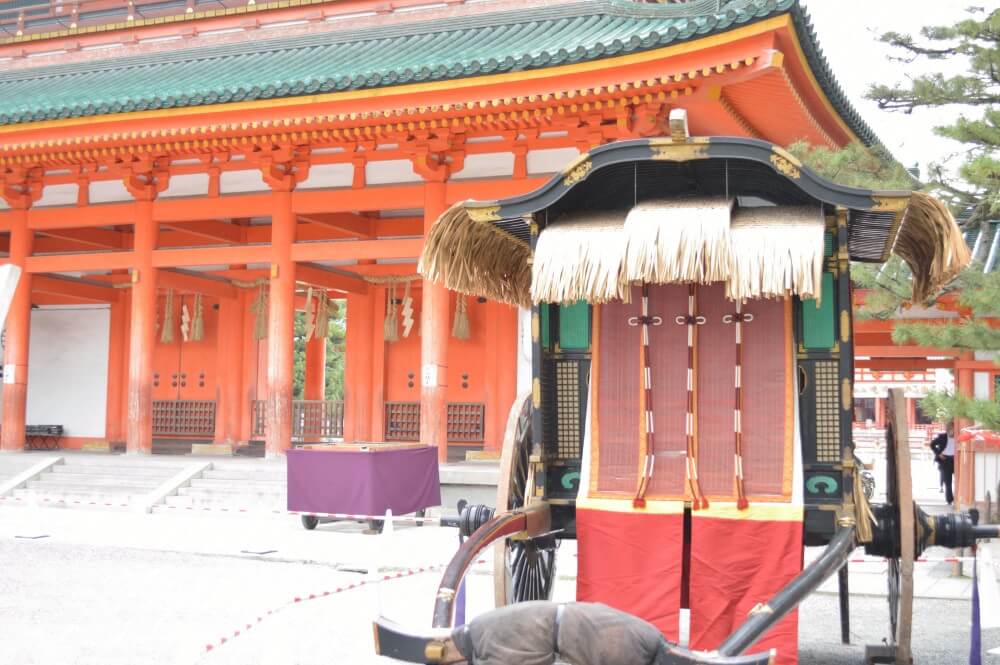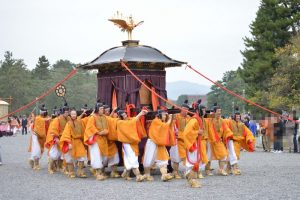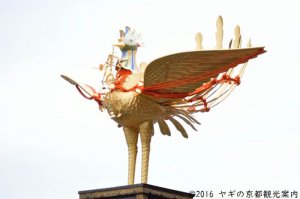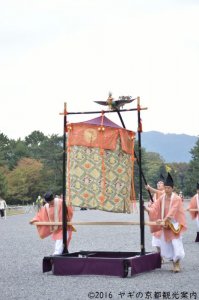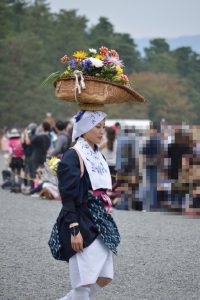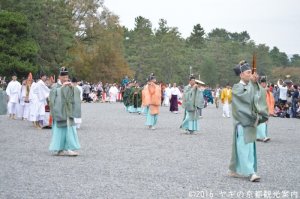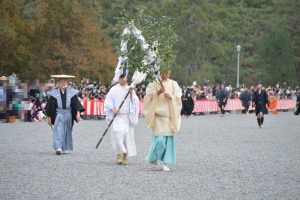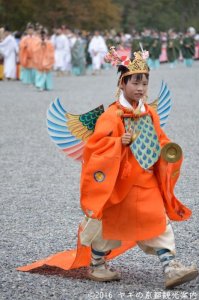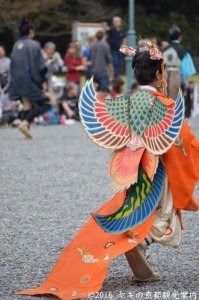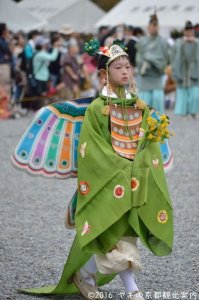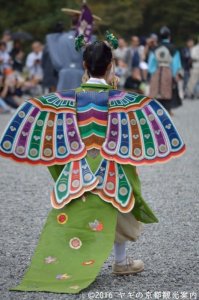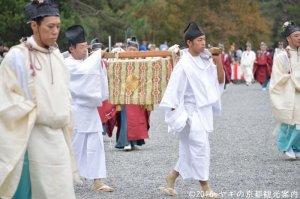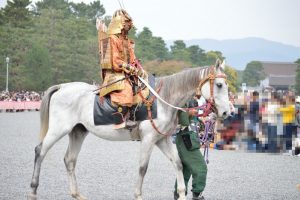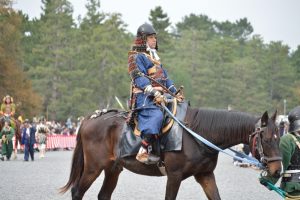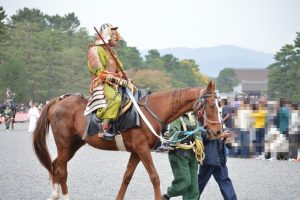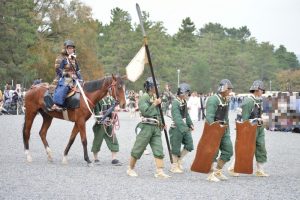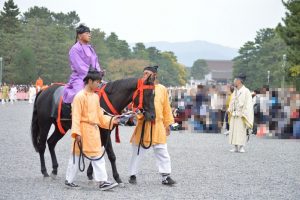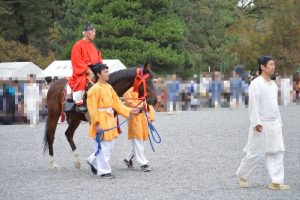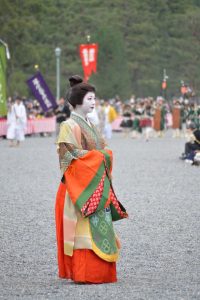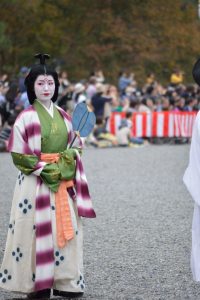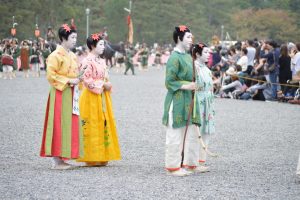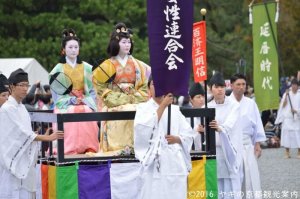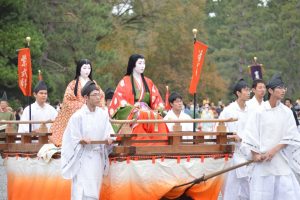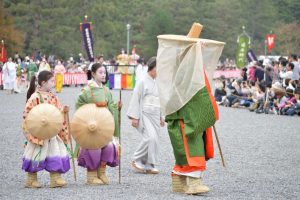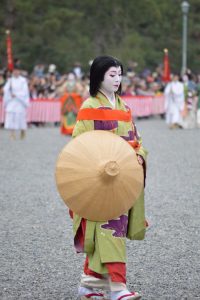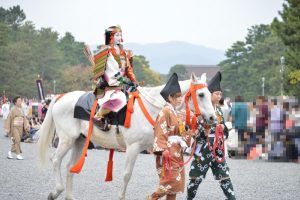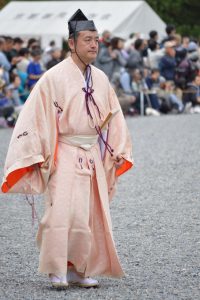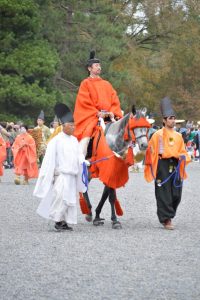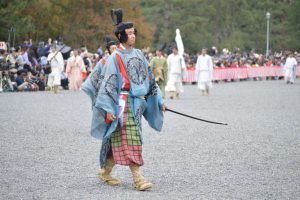THE GIST OF THIS ARTICLE
- Page 1 Schedul of 2025, What is Jidai Matsuri?, Reservation seat
- Page 2 Jidai Gyoretsu Parade 1: Shinkoretsu, Enryaku Period, Heian Period
- Page 3 Jidai Gyoretsu Parade 2: Kamakura period, Yoshin Period, Muromachi Period
- Page 4 Jidai Gyoretsu Parade 3: Azuchi Momoyama period, Edo Period, Meiji Ishin Period
- Page 5 The Route of Paeade
The following is the contents of this article.
Jidai Gyoretsu parade Overview
The parade of Jidai matsuri festival is called Jidai Gyoretsu. It goes on in anti-chronicle order. In this artilcle, we see it in chronicle order to understand Japanse history with ease.
Each unit of the parade stands for a period in Japanese history. The garments and equipments are made in exactly the same way in the period they belong to. The price tag of some of them are over 1 bilion yen. Some of the women in the parede are Maiko/Geiko.
Shiko retsu 神幸列
Gohoren 御鳳輦
The spirit of the emperors are in Gohoren. Gohoren is a special carry for the emperor. On top of it, there is a figurine of Ho-oh, the Japanese phoenix.
This is a Kingai, a shade for the emperor. He walks under it.
Shirakawame 白川女献花列
They brought flowers to the Imperial Palace from the foot of Mt. Hiei.
Zen retsu前列
Overview
They leads Shinko retsu playing Japansed traditional music named Gagaku.
Sakaki 御賢木
Sakaki is scred plant in the Shinto.
Kabin Ryoga 迦陵頻伽
The boy is a dancer. Kabin Ryoga is a imaginary bird living in Gokuraku jodo, a kind of heaven. If you are interested in Gokuraku jodo, see the link below.

Kocho 胡蝶
Kocho means betterfly. He also is a dancer performing Kocho no mai dance.
The chapter “The Butterflies” in The Tale of Genji is named after the dance.
Sinsen Kosha retsu 神饌講社列
Shisen is a meal prapare for Deity. It is brought in a small box named Shinsen Karabitsu(神饌唐櫃).
Enryaku period 延暦時代
Overview
Enryaku period is the rein of emperor Kannmu.
The military personnel 延暦武官行進列
In this period, armors are in primitive fashion. The man on a white horse is Sakanoue no Tamuramaro. He is a general and shogun(征夷大将軍) conqured Emishi, the ethnic group lived in Tohoku region. His armor is plastered genuine gold.
The court nobles 延暦文官参朝列
In the period, court nobles went to the Imperial court to offer greetings ot the emperor.
They are in garments named Iho. The colors of them means their ranks. The purple is the highest.
Heian period 794~1185 平安時代
Overview
Heian period is the golden age of the court nobles and the Imperial court has strong infulence over political decision.
Heian jjidai fujin retsru (The ladies in Heian period)平安時代婦人列
Early heian period
She is Onono Komachi, a famous poet in the time. She was one of 6 great poets in the early Heian period.
The lady with a fan is Wake no Hiromushi. She is a sisiter of Wake no Kiyomaro, the famous adovocator of emperor Kanmu. Kiyomara advised to emperor Kanmu to move the capital to Kyoto.
They are orphans Hiromushi adopted. She established an orphanage for the first time in Japanese history.
They are court ladies in the rein of emperor Kanmu.
In this period, the outfits are under strong influence of Tang Dynasty.
Mid Heian period
The left is Murasaki Shikibu. She is the author of The Diary of Lady Murasaki which tells us what the Imperial court was at that time.
In this period, missions to Tang Dynasty was abolished and Japan developed its own style in any respect.
Late Heian period
The right is Seisyo nagon. She is the author of The Pillow Book. which shows us the life of court nobles.
The lady on hat is Tokiwa gozen. She asked Taira no Kiyomori, the plitical opponents of her deceased husband, to kill her instead of her children. Her courage made Kiyomori save their lives.
She is Yokobue, the Juliet of Heian period. She fell in love with Tokiyori, her Romeo, but his family rejected their marriage. He became a Buddhist priest. She found him in a small temple in Arashiyama but he didn’t meet her. After the incident, she became ill and passed away. The temple sitll exists in Arashiyama. It looks like a debris of temple and there are small figurine of them. One of may favorite place in Kyoto.
She is a famous lady-worrior in Heian period.
Fujiwara kygyo sancho retsu 藤原公卿参朝列
The court nobles enjoyed prosperous life and political power in Heian period.

